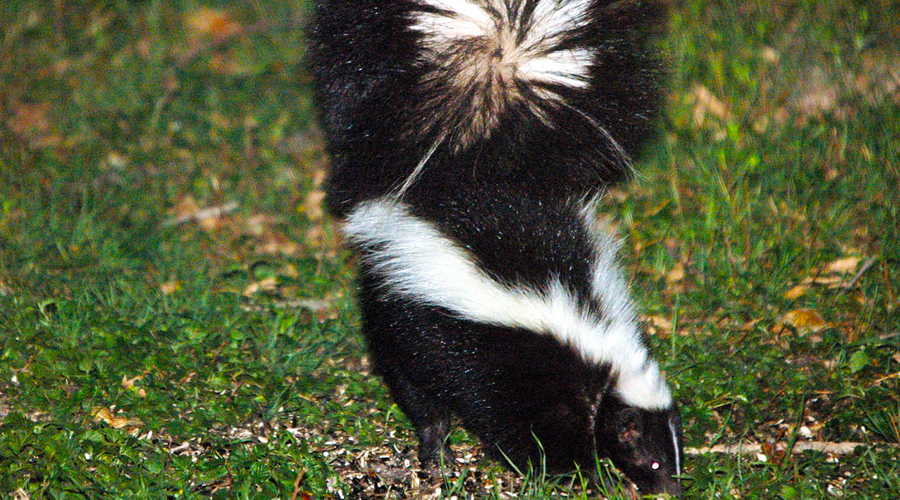If you’re familiar with the notoriously noxious smell that tends to waft through neighborhoods in the Lake Travis area, you know skunks are afoot.
Did you know their scent can be picked up by your human nose from more than a mile away?
They can also spray their victim from up to ten feet away with accuracy that rivals precision rifle shooters. In fact, they can control the amount of mist they spray and spray up to six times consecutively.
This isn’t good news for those of us with functioning noses and/or pets.
But in all fairness, the skunks were here first. This is the Texas Hill Country. It’s full of all sorts of wild critters who have been happily living here long before we showed up.
So how do we co-habitat with these smelly polecats?
First of all, skunks are docile creatures. They like to eat snakes, insects and other small rodents. They all have terrible eye sight, which is why they stumble into trouble sometimes.
Humans, pets or loud noises can easily startle a skunk because it can’t see what’s happening.
If you find yourself near one, move slowly and use a gentle voice or motion. If it starts to growl, spit, fluff its tail or stomp its front feet, you’d better run — there’s a putrid perfume in your immediate future!
Protecting Pets
Pets vs Skunks
As you already know, a skunk’s stinky spray is its only line of defense. This means a curious cat or a playful pup can easily be on the receiving end of this unpleasant attack. The biggest issue with a pet being sprayed — aside from the smell itself! — is the oil in the skunk’s spray is incredibly hard to neutralize.
Don’t Panic
If your pet get sprayed, the smell is going to make him/her extremely stressed out due to the intense odor. Plus, if the spray gets in your pet’s eyes, they may be in pain too.
If your pet’s eyes are red, rinse them with water. The vile smell can cause some pets to foam at the mouth too. Chances are, if your pet gets sprayed by a skunk, you’ll know immediately!
Keep fido outside
Your skunked pet needs to stay outside or the smell will quickly contaminate your home and it’s incredibly difficult, if not impossible, to remove.
If your immediate reaction is to grab a hose and start rinsing, you’ll quickly notice that getting your pet wet will intensify the smell. Yep, that happens.
Neutralize the odor
Don’t reach for the tomato juice, that’s an old wives’ tale.
You need certain types of chemicals to actually neutralize the skunk’s spray and remove the oil/odor.
Many pet stores have over the counter remedies created especially for this kind of emergency. Plus, local vets and groomers offer services to de-skunk your four-legged friend.
DIY de-skunking
If you need to tackle this smelly situation ASAP, you may have the right ingredients in your medicine cabinet:
- 1 quart of 3-percent hydrogen peroxide
- 1/4 cup baking soda
- 1 teaspoon liquid dishwashing soap
Make sure you wear gloves when you wash your pet and keep the solution away from its eyes and mouth. After you rinse your pet, use regular pet shampoo.
Protecting your yard and home
Have you ever been sitting in your home when a skunk smell wafts into your nostrils?
The smell is so strong, you’d swear it was in the house. Do you look around momentarily expecting a skunk to trot by your sofa and wave hello?
Your instincts may tell you to run to the nearest door and peek outside, but don’t do this! If you startle a skunk that may be wandering on your porch or near your garage, it will spray you. While skunks are nocturnal, their night vision is still pretty bad.
The best thing you can do is make sure all of your doors and windows are shut. If your garage door is open, make sure the skunk has not wandered in, and then shut it. When the skunk leaves, the odor will eventually dissipate.
Some Lake Travis residents use L-shaped barriers like black mesh at the bottom of their fences or decks to keep skunks out.
If you think a skunk is getting into to your home via attic or basement, that’s when professional pest removal services become necessary because you definitely don’t want them around full-time. Remember, professionals do their best not to spook skunks to avoid triggering a spray attack.
If you’re trapping other pests and accidentally trap a skunk, the best thing you can do is release it slowly. Move towards it quietly and with caution. If you don’t scare it, it should make a beeline for home as soon as you set it free. If you see angry stomping feet, remain motionless until it calms down.
If you have tips to share with other Lake Travis residents about effective and humane ways to co-exist with our fusty friends, let us know in the comments section on Facebook.
Post image via Creative Commons, Clinton & Charles Robertson on Flickr.

Interesting. I always thought tomato juice would work and did not know they had such poor vision.
Thanks for the info.